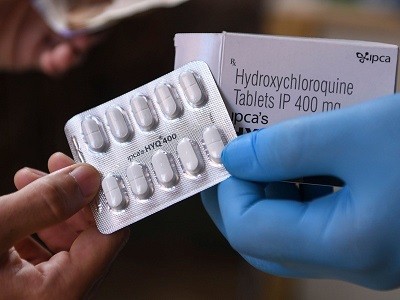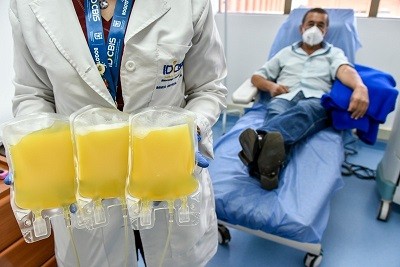Latin America’s embrace of an unproven COVID treatment is hindering drug trials
drug's effectiveness against the coronavirus.
As much of the world waits for an effective vaccine to curb the COVID-19 pandemic, some in Latin America are turning to an unproven treatment. There isn’t enough evidence that the drug, ivermectin, is safe or effective as a coronavirus therapy, however. So researchers are cautioning against using it outside clinical trials. Still, people in the region have rushed to take it, making it hard for researchers to properly test it.
Ivermectin, an inexpensive, over-the-counter medicine, has been used for decades to treat livestock and people infested with parasitic worms — and in the past few months, its popularity as a preventative against COVID-19 has surged in Peru, Bolivia, Guatemala and other Latin American countries.
The drug has been so in demand that in May, health-care workers passed out some 350,000 doses to residents in northern Bolivia. That same month, the Peruvian police seized around 20,000 bottles of animal-grade ivermectin that was sold on the black market as a treatment for human coronavirus infections. And in July, a university in Peru announced that it would produce 30,000 doses to bolster the country’s supply.
But the evidence that ivermectin protects people from COVID-19 is scant. Some early studies in cells and humans hinted that the drug has antiviral properties, but since then, clinical trials in Latin America have struggled to recruit participants because so many are already taking it.
“Of about 10 people who come, I’d say 8 have taken ivermectin and cannot participate in the study,” says Patricia García, a global-health researcher at Cayetano Heredia University in Lima and a former health minister for Peru who is running one of the 40 clinical trials worldwide that are currently testing the drug. “This has been an odyssey.”
The price of popularity
Ivermectin grabbed attention in April, when scientists were throwing every already-approved drug they could at the coronavirus. Researchers in Australia had noted that high doses of ivermectin could stop the virus from replicating in cells1. Shortly afterwards, a preprint appeared online that suggested the drug could reduce coronavirus-related deaths in people.
That report was later removed from the site by some of its authors because, they told Nature, the study was not ready for peer review. The preprint had included an analysis of electronic health records by the company Surgisphere, which provided unreliable COVID-19 data sets that raised red flags for scientists in late May. By June, two other high-profile COVID-19 studies were retracted that contained data from the firm.
But as far as many doctors and patients in Latin America were concerned, ivermectin’s reputation was already cemented. Doctors began justifying the drug’s use against COVID-19, arguing that even if it didn’t work, at least it had a proven safety profile for treating parasites, says César Ugarte Gil, an epidemiologist at Cayetano Heredia who is running the clinical trial with García.
The eagerness to use the treatment only grew as the virus spread aggressively throughout Latin America. About 153,000 people in Brazil have died of COVID-19 — the second largest death toll globally. And Argentina, Colombia and Peru have all posted some of the largest case numbers worldwide. “I do not judge a doctor who has a dying patient before him and, desperate, tries anything [to save her],” says Carlos Chaccour, a Venezuelan researcher at the Barcelona Institute of Global Health in Spain. “The problem is when non-evidence-based public policies are made.”
The implementation of such policies kicked off on 8 May, when the Peruvian Ministry of Health recommended using ivermectin to treat mild and severe cases of COVID-19. Days later, Bolivia’s government added the drug to its guidelines for treating coronavirus infections. The municipality of Natal, in Rio Grande Do Norte, Brazil, also promoted it as a preventative — to be taken by health-care professionals and people at increased risk of severe illness from the virus, because of “its safe pharmacological profile, clinical experience using it against other diseases, cost and dosage convenience”.
Peru and Bolivia have been transparent about how slim the evidence is for using ivermectin against COVID-19. “It is a product that does not have scientific validation in the treatment of the coronavirus,” acknowledged Bolivian health minister Marcelo Navajas in a press conference on 12 May.
The situation troubles researchers who are trying to run clinical trials. Not only is the drug’s popularity making it difficult to recruit people who have not already taken it — which is necessary to show the drug’s effectiveness — but also doctors are not documenting possible side effects when they prescribe the drug, meaning valuable data on its safety are being lost, says Ugarte Gil.
Self-medication is on the rise because people can easily buy ivermectin at drug stores, says pharmacologist Carlos Calderón Ospina from the University of El Rosario in Bogotá. In June, some of his colleagues published a report suggesting that, because of the way it binds to proteins in blood plasma, the drug would need to be given at high concentrations to achieve an antiviral effect in humans2. “These very high doses would carry a risk of adverse effects that would be unacceptable,” he says.
Although most people tolerate ivermectin well, it has been linked to tremors, convulsions, lethargy and disorientation. A 2018 analysis found cases of brain damage and coma in people with a genetic mutation that allows ivermectin to pass from the bloodstream into the brain3.
“What we’re having is a populist treatment, instead of an evidence-based treatment,” says García.
Trials crack on
But that doesn’t mean researchers have given up on collecting the necessary evidence. In late September, Alejandro Krolewiecki, an infectious-disease physician at the National University of Salta in Orán, Argentina, and his colleagues announced the results of a small clinical trial evaluating ivermectin’s effectiveness against COVID-19. The researchers recruited 45 people with mild and moderate COVID-19 and gave ivermectin to 30 of them for 5 consecutive days at a daily dose about 3 times as high as what’s used to treat parasite infections; the rest of the participants received only standard COVID-19 care. Their findings suggest that in people who absorbed a higher concentration of ivermectin, “a clearer, faster and more intense viral elimination occurred”, says Krolewiecki.
The news is encouraging, says Chaccour, who has been critical of ivermectin’s use in Latin America. But it’s not enough to give ivermectin wonder-drug status, he adds, particularly because Krolewiecki’s results have not yet been published, peer-reviewed or replicated.
Krolewiecki agrees. “It is a bit reckless for someone to say, from the studies we have completed, that we should prescribe this drug,” he says.
More data are on the way. In the next few weeks, Chaccour plans to submit results from a pilot study for publication. His team recruited 24 people with COVID-19 and administered ivermectin to some of them and a placebo to the others. Chaccour declined to tell Nature whether the results look promising, but he’s encouraged that trials are yielding data, even if slowly.
“That’s what we asked for from the beginning,” he says. “There should be some guidance before making public-policy decisions.”
Still, researchers might never have sufficient data to justify ivermectin’s use if its widespread administration continues in Latin America. The drug’s popularity “practically cancels” the possibility of carrying out phase III clinical trials, which require thousands of participants — some of whom would be part of a control group and therefore couldn’t receive the drug — to firmly establish safety and efficacy, says Krolewiecki.
As unchecked use of ivermectin grows, he says, “the more difficult it will be to collect the evidence that regulatory agencies need, that we would like to have, and that will get us closer to identifying the real role of this drug”.
Nature 586, 481-482 (2020)
UPDATES & CORRECTIONS
Correction 02 December 2020: This story was updated to reflect that Natal is not a state in Brazil. It is the capital city in Rio Grande do Norte, Brazil.
References
- 1.
Caly, L. et al. Antivir. Res. https://doi.org/10.1016/j.antiviral.2020.104787 (2020).
- 2.
Peña-Silva, R. et al. Br. J. Clin. Pharmacol. https://doi.org/10.1111/bcp.14476 (2020).
- 3.
Chandler, R.E. Am. J. Trop. Med. Hyg. 98, 382–388 (2018).
https://www.nature.com/articles/d41586-020-02958-2




